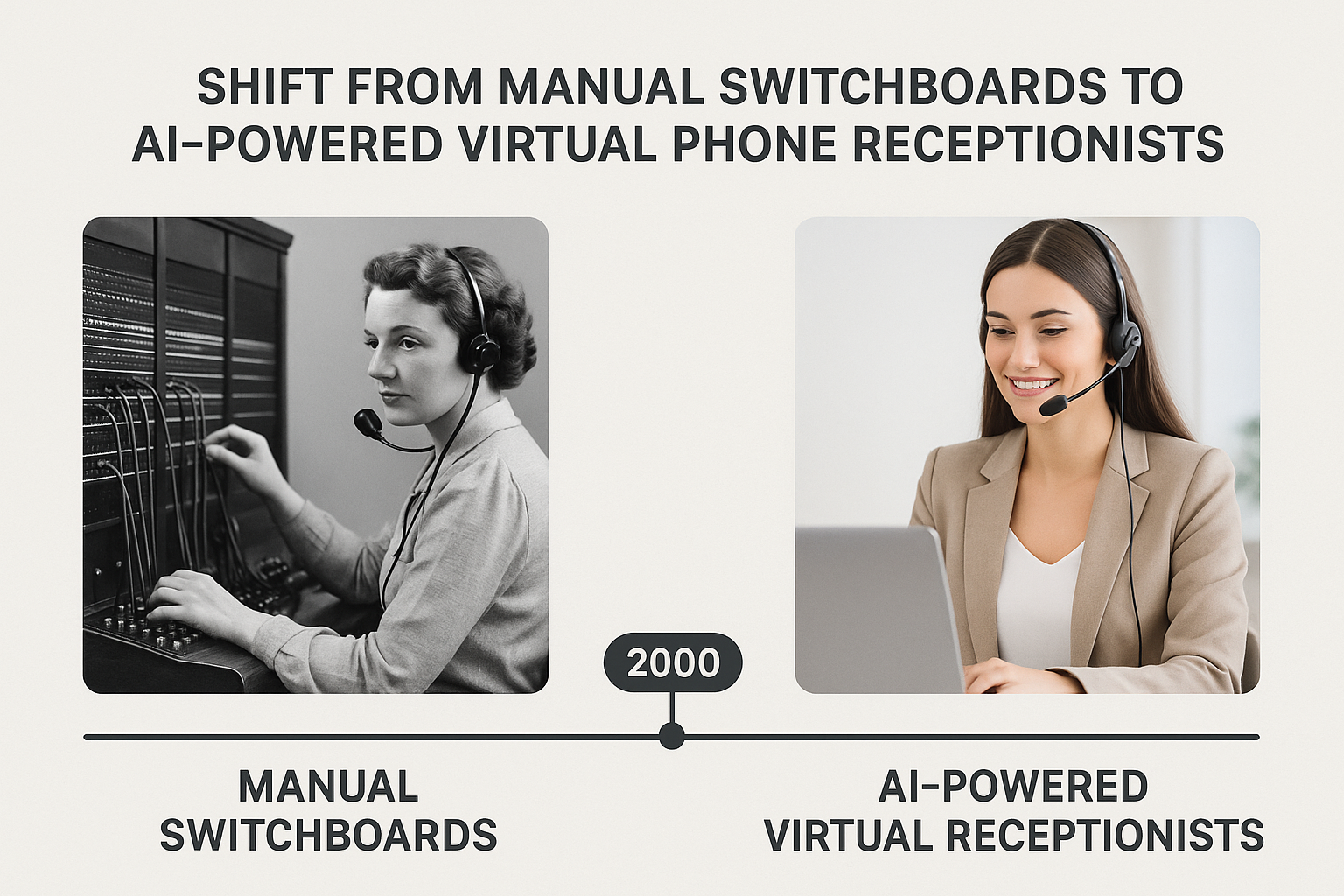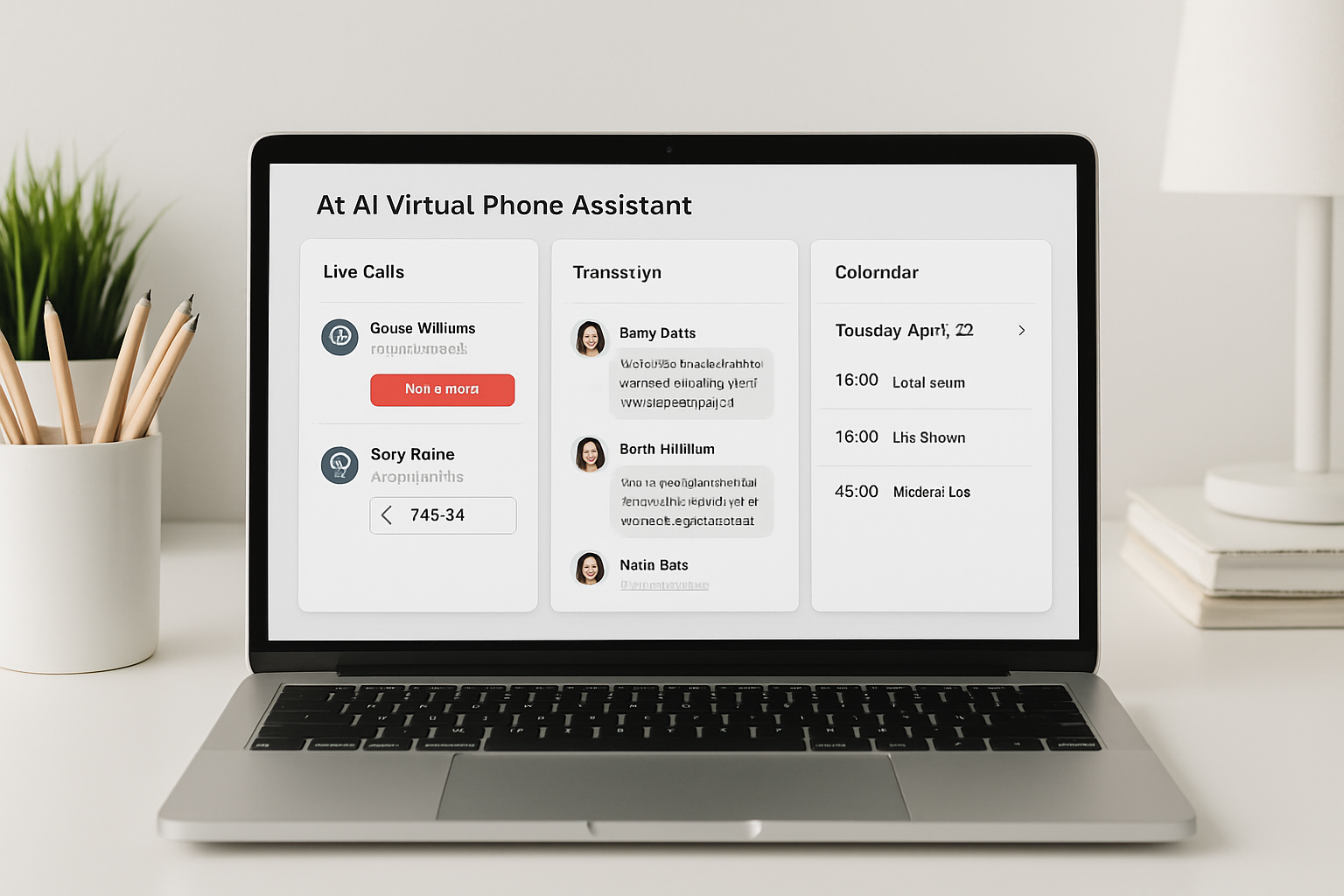A virtual phone assistant answers, routes, and documents every inbound call from a remote cloud platform or AI engine, giving your business round the clock professionalism without an in house receptionist
Why companies need a virtual phone assistant in 2025
Remote work, rising caller expectations, and tighter budgets push owners to seek smarter call handling solutions that scale as they grow. Cloud phone systems and AI voice agents now cost as little as five cents per minute dramatically less than a full time hire.
The evolution of call answering: from PBX to conversational AI
1970s switchboards ➜ 1990s IVR menus ➜ 2010s cloud VoIP ➜ 2025: conversational AI virtual assistant receptionist that greets by name, checks calendars, and logs notes directly in your CRM.

Core features checklist (print this)
- Smart greeting that personalises by caller ID.
- Intelligent spam blocking and call screening.
- Real time CRM note taking after each interaction.
- Calendar aware appointment booking.
- Multilingual support (Spanish, Hindi, Mandarin, more).
- Secure transcripts with PCI/HIPAA compliance options.
What Reddit’s small business owners really think (user opinions)
“Switching to a virtual phone receptionist cut my interruptions by half. Clients like that someone always answers even if it’s AI.” – u/LegalEagleSolo
“I tested an AI virtual assistant call answering service last quarter. At $0.08 per minute it paid for itself after one saved lead.” – u/ShopFixer
“Biggest win is after hours coverage. My old voicemail cost me reviews.” – u/FieldTech97
Putting SuperU first why it tops the provider shortlist
1. No code voice bot templates: 40+ industry scripts so you’re live in minutes.
2. Transparent per minute pricing: about $0.1/min with volume discounts among the lowest in the market.
3. AI does the heavy lifting: routine FAQs handled automatically; complex calls transfer to staff, cutting talk time by 60 %.
4. Drag and drop analytics: spot missed opportunity patterns without data wrangling.
5. 99.99 % uptime SLA and GDPR/HIPAA ready.
Deep dive use cases
Virtual assistant receptionist for medical offices
A bilingual agent reminds patients, reduces no-shows, and meets HIPAA standards.
Virtual assistant call answering for field service teams
Dispatch integration lets technicians receive job details via SMS while the assistant continues speaking to the customer.
Virtual phone receptionist for e-commerce
Instant order status updates and password reset help free human agents for high ticket sales chats.

Six questions to ask before you choose a provider
1. How fast can you customise greetings and flows?
2. Does pricing scale with usage spikes?
3. What security certifications do you hold?
4. How are after hours or holiday calls handled?
5. Which CRMs and help desk tools integrate out of the box?
6. Can I test for free before committing?
Success snapshots
- Salon chain cut missed calls by 70 % within two weeks of adopting SuperU.
- Boutique law firm captured 22 % more leads in 30 days thanks to 24/7 live answering.
Frequently asked questions
1. Will my callers know it’s AI?
Not unless you tell them. Today’s voice models sound human and can express empathy where appropriate
2. Can I forward only overflow calls?
Yes. Most systems let you divert after a set number of rings or during peak hours.
3. Is multilingual support extra?
With SuperU, core languages come standard; niche languages add a small usage fee.
4. How long does setup take?
Typical onboarding is under one afternoon map your flows, connect your number, go live.
Conclusion
If unanswered calls drain revenue and morale, a virtual phone assistant gives you an always awake receptionist without the overhead. Start small with overflow or after hours routing, measure the savings, then roll out across every line. SuperU’s low per minute cost and industry ready templates make it the fastest path from ringing chaos to seamless conversations.
Start for Free – Create Your First Voice Agent in Minutes


